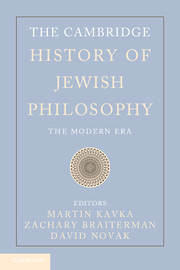Book contents
- Frontmatter
- Contents
- Contributors
- Acknowledgement
- Introduction
- I Judaism's Encounter with Modernity
- 1 Enlightenment
- 2 The Spirit of Jewish History
- 3 Phenomenology
- 4 America
- 5 Feminism and Gender
- II Retrieving Tradition
- III Modern Jewish Philosophical Theology
- IV Jewish Peoplehood
- V Issues in Modern Jewish Philosophy
- Bibliography
- Index
2 - The Spirit of Jewish History
from I - Judaism's Encounter with Modernity
Published online by Cambridge University Press: 28 September 2012
- Frontmatter
- Contents
- Contributors
- Acknowledgement
- Introduction
- I Judaism's Encounter with Modernity
- 1 Enlightenment
- 2 The Spirit of Jewish History
- 3 Phenomenology
- 4 America
- 5 Feminism and Gender
- II Retrieving Tradition
- III Modern Jewish Philosophical Theology
- IV Jewish Peoplehood
- V Issues in Modern Jewish Philosophy
- Bibliography
- Index
Summary
INTRODUCTION: MEANING AND HISTORY
Though its earliest sources were in some sense Jewish, the philosophy of history was a Christian invention and reached a secularized apex in the modern version of G. W. F. Hegel, according to whom history, since the primitive origins of the state, is the saga of the unfolding of human freedom. There was “meaning in history,” for a long tradition culminating in Hegel, and it was sometimes available no other way. The philosophy of history posed a very particular challenge to Judaism, which found itself reduced to a fossilized remnant of a past age and condemned to disappearance: on the Christian model, as well as in that model's secularized successors, the fulfillment of the design foreordained by God or immanent in the historical process meant the cancellation and supersession of early relics like the Jewish people and its religion.
According to the typical current view, not surprisingly, it fell to Jewish thinkers in modern times to argue that the ultimate sources of meaning are outside of history rather than in it. “[The thinker] now finds man under the curse of historicity,” Franz Rosenzweig famously wrote, epitomizing this task. “But he will be unable to eliminate the God to whom the historicity of history is subjugated by His historical deed.” Though he started it and may act in it, God himself is – Rosenzweig insists – outside history.
- Type
- Chapter
- Information
- The Cambridge History of Jewish PhilosophyThe Modern Era, pp. 75 - 96Publisher: Cambridge University PressPrint publication year: 2012



